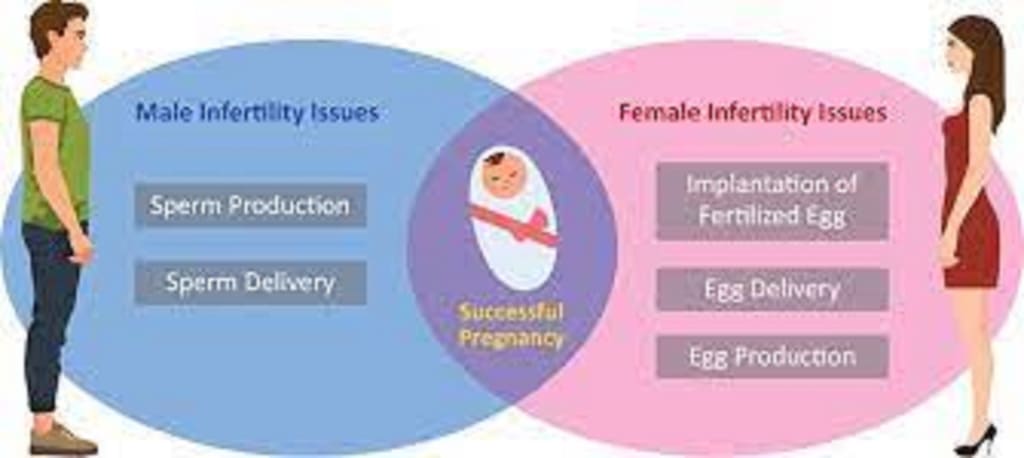Cases of Infertility in Men and Women
Ten Stages Case of Infertility and its Treatment

Cases of Infertility in Men and Women
Infertility is a medical condition that affects both men and women and can occur at any stage of life. Infertility is defined as the inability to conceive a child after 12 months of unprotected sex. In this article, we will discuss the stages of infertility in men and women.
Trying to conceive
The first stage of infertility is when a couple starts trying to conceive. It's important to understand that it can take several months for a healthy couple to conceive, and this is considered normal. However, if after 12 months of trying to conceive, pregnancy has not been achieved, it may be time to consult a doctor.
Initial medical evaluation
If a couple is unable to conceive after a year of trying, they should seek medical evaluation. In the initial evaluation, both partners will undergo a medical history, physical examination, and a series of tests to determine the cause of infertility. For women, the tests may include a pelvic exam, blood tests to check hormone levels, and an ultrasound to check the uterus and ovaries. For men, the tests may include a semen analysis to check sperm count and quality.
Diagnosing infertility
After the initial evaluation, a diagnosis will be made to determine the cause of infertility. In women, the most common causes of infertility are ovulatory disorders, tubal blockages, and endometriosis. In men, the most common causes are low sperm count, poor sperm quality, and anatomical problems.
Treatment options
Once the cause of infertility has been determined, the next step is to discuss treatment options. Treatment options will depend on the cause of infertility and may include medications to stimulate ovulation, intrauterine insemination (IUI), or in vitro fertilization (IVF). In men, treatment options may include medication to improve sperm count and quality or surgical intervention to correct anatomical problems.
Assisted Reproductive Technologies (ART)
Assisted reproductive technologies (ART) are advanced fertility treatments that can help couples achieve pregnancy. ART includes treatments such as in vitro fertilization (IVF), intracytoplasmic sperm injection (ICSI), and frozen embryo transfer (FET). These treatments are usually recommended for couples who have been trying to conceive for a long time without success.
Emotional support
Infertility can be an emotionally challenging experience for couples. It's important to seek emotional support throughout the process. Support can come from family and friends, support groups, or a mental health professional.
Lifestyle modifications
In addition to medical interventions, lifestyle modifications can also help improve fertility. For women, maintaining a healthy weight, quitting smoking, and reducing alcohol consumption can all help improve fertility. For men, maintaining a healthy weight, quitting smoking, reducing alcohol consumption, and avoiding heat exposure to the testicles can all help improve sperm count and quality.
Repeat medical evaluations
If a couple is undergoing infertility treatment, repeat medical evaluations will be necessary to monitor progress and adjust treatment as needed. In addition, regular check-ups with a healthcare provider can help detect any underlying medical conditions that may be contributing to infertility.
Consider alternative options
For some couples, alternative options may be considered if infertility cannot be treated or if treatment is unsuccessful. Alternative options may include adoption or using a donor egg or sperm.
Continuing care
Even after achieving pregnancy, ongoing medical care and support are necessary for a healthy pregnancy and delivery. Women who have undergone fertility treatment may have a higher risk of pregnancy complications, such as preterm labor or low birth weight, and will require close monitoring throughout pregnancy.
In conclusion, infertility is a complex medical condition that can be caused by a variety of factors in both men and women. Treatment options will depend on the cause of infertility and may include medical interventions, lifestyle modifications, and assisted reproductive technologies. Seeking emotional support and ongoing medical care are also important throughout the process.
About the Creator
Sumera Saeed
I am a professional article writer since 2015. The best topic in my field is Food, Beauty, Business, and health. You can also request on my E-mail address which is given on my site.





Comments
There are no comments for this story
Be the first to respond and start the conversation.